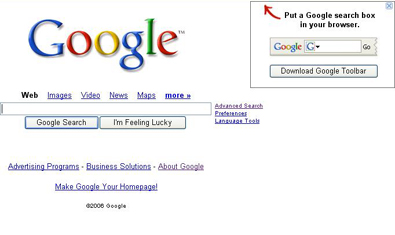Google changing 'philosophy'

"The Science and Art of User Experience at Google" was the topic of a presentation at Google’s Kirkland, Washington, operations last June by Jen Fitzpatrick, Google Engineering Director (“Google wants to pay you to improve Google usability”):
Fitzpatrick noted the “utter simplicity of our homepage” has changed remarkedly little from its beginnings in 1999 when Sergey Brin had the task of building a homepage for the new service he and Larry Page were building out. According to Fitzpatrick, Brin at the time did not know html and was not interested in learning it. What Brin was really passionate about, according to Fitzpatrick, was building a search engine; Putting together a home page was simply a way to get the service up and running as quickly as possible. Fitzpatrick indicated that in some respects the Google home page of today is a “happy byproduct of laziness on his part.
In Google’s “Our Philosophy” corporate backgrounder, Page waxes poetic about “the perfect search engine” and portrays Google’s quest to “never settle for the best.”
Among the “Ten things Google has found to be true”:
1) Focus on the user and all else will follow.From its inception, Google has focused on providing the best user experience possible. While many companies claim to put their customers first, few are able to resist the temptation to make small sacrifices to increase shareholder value. Google has steadfastly refused to make any change that does not offer a benefit to the users who come to the site:As I reported yesterday, Google’s homepage can now be seen sporting a non-Googley, intrusive sales pitch for a Google product, the Google Toolbar:
- The interface is clear and simple.
- Pages load instantly.
- Placement in search results is never sold to anyone.
- Advertising on the site must offer relevant content and not be a distraction.
6) You can make money without doing evil.
Google is a business. The revenue the company generates is derived from offering its search technology to companies and from the sale of advertising displayed on Google and on other sites across the web.
However, you may have never seen an ad on Google. That's because Google does not allow ads to be displayed on our results pages unless they're relevant to the results page on which they're shown. So, only certain searches produce sponsored links above or to the right of the results. Google firmly believes that ads can provide useful information if, and only if, they are relevant to what you wish to find.
Google has also proven that advertising can be effective without being flashy. Google does not accept pop-up advertising, which interferes with your ability to see the content you've requested.
We've found that text ads (AdWords) that are relevant to the person reading them draw much higher clickthrough rates than ads appearing randomly... Advertising on Google is always clearly identified as a "Sponsored Link." It is a core value for Google that there be no compromising of the integrity of our results.
Google can no longer hold up the vaunted, pristine Google homepage as virgin territory. Google is selling out and selling its primo homepage real estate bigtime.
Google apparently has had enough of subtle one-liners underneath the Google search box suggesting ever so gingerly to users that they ought to try out the latest Google product or service.
No, Google is taking a stand and standing up in particular for the Google Toolbar!

Google will undoubtedly attempt to downplay the significance of a Google self-promotional “defacement” of its “utterly simplistic” homepage with talk of how Google regularly “tests” its homepage.
Despite probable Google Speak, however, the so-called “test” speaks for itself:
The Google homepage interface is less clear and simple
The Google homepage may load less “instantly”
The Google Toolbar advertisement is a distraction
The Google Toolbar advertisement is flashy
The Google Toolbar advertisement interferes
The Google Toolbar advertisement is not identified as such
Google's "old-school" promo for its own product, test or not, marks a change in Google's "philosophy."
To vote "Thumbs-Up" or Thumbs-Down" on Google's new promo philosophy, click here: GOOGLE DEFILES HOMEPAGE?